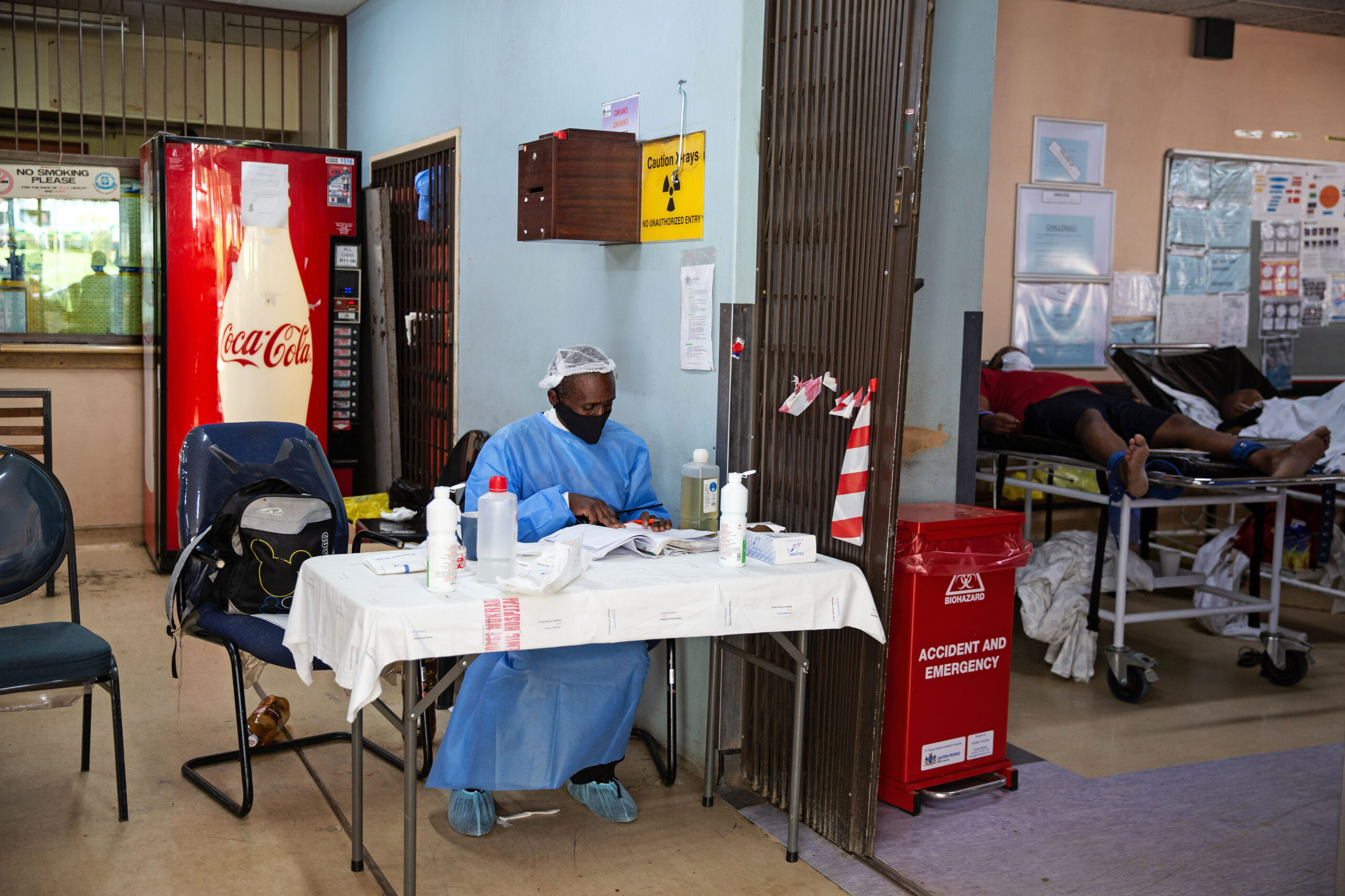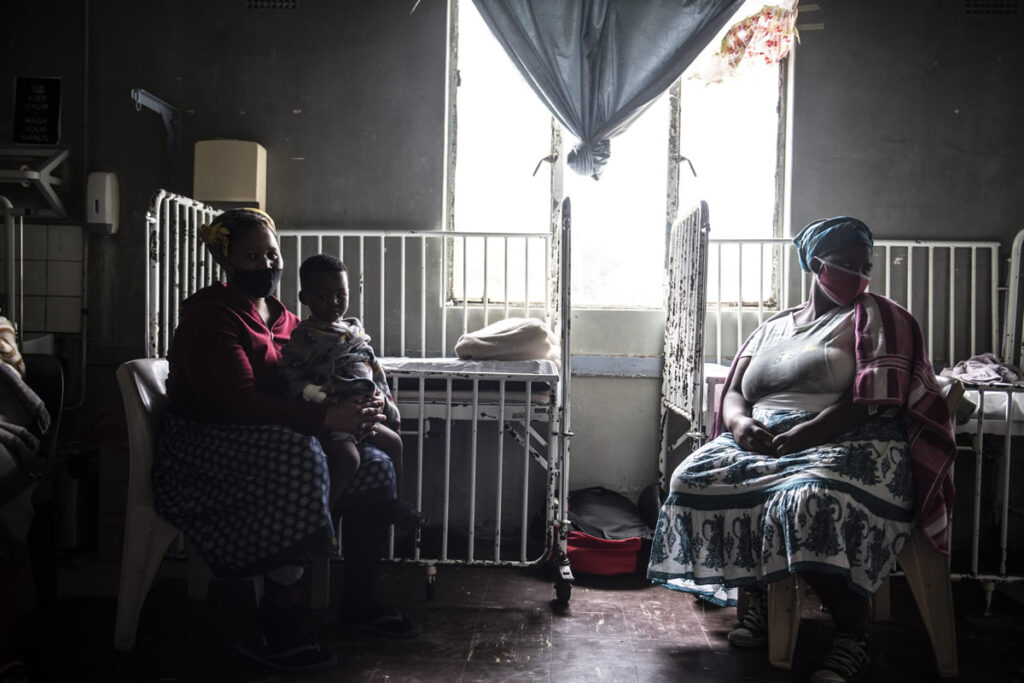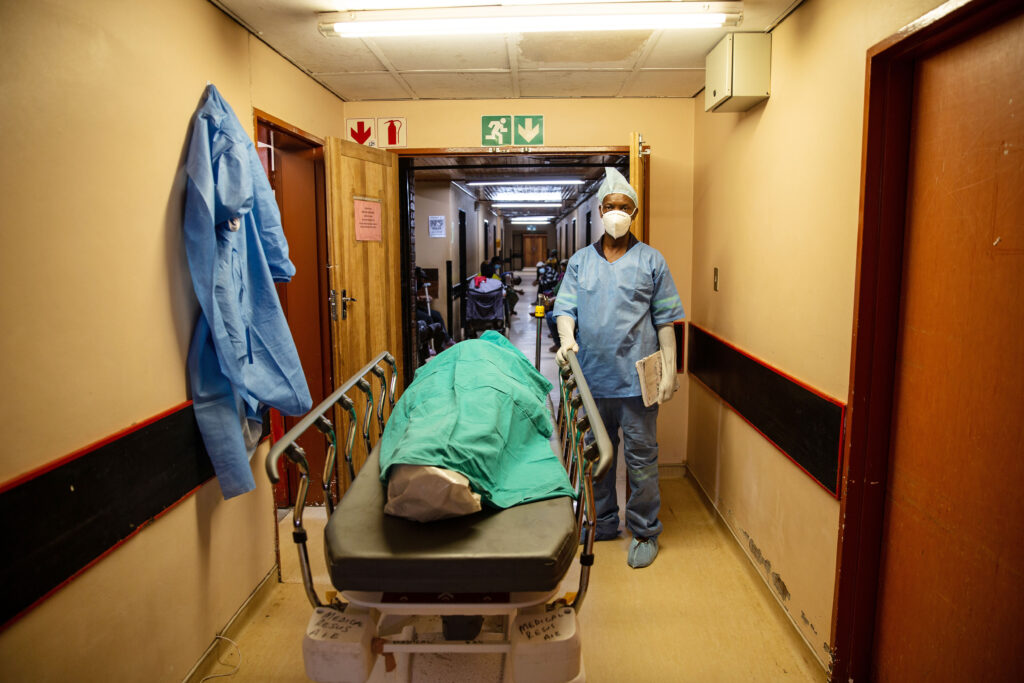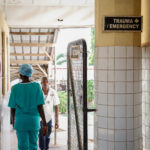- To deal with dangerous situations at hospitals and clinics, like when patients or visitors become aggressive, security guards are on hand.
- Different facilities have different security needs, though, and so they require guards that are trained for handling their specific issues.
- Yet guards are often ill equipped for their roles — because their training doesn’t always prepare them for what they might have to deal with.
- In the Western Cape, a training programme that teaches security guards to diffuse dangerous situations the right way can help security personnel feel more confident about keeping health facilities safe.
An aggressive patient stabbing two doctors in an emergency room at the Kimberley Hospital.
A nurse shot and killed by her off-duty policeman boyfriend at Tembisa Hospital.
Patients robbed and one killed in a Northern Cape hospital while recovering after treatment.
Government hospitals and clinics should be safe. But they’re not — and at least part of the reason is that security guards aren’t trained for every type of situation they have to handle at these facilities.
Between 2017 and 2022, around 200 violent incidents at public hospitals were reported across four provinces. And that’s only security issues that were big enough to get noticed. Petty crimes such as theft from patients or staff, verbal abuse or cases where a situation is diffused can easily fall by the wayside.
To make hospitals safe, security guards need training to help them deal with angry, emotional or aggressive situations, on top of general safety issues such as protecting property and monitoring access to a facility.
But they’re ill equipped.
Why?
Because to get a job as a security guard at a hospital, tenders require personnel to have only general training — the same as what guards working at, for example, residential complexes or shopping malls must have. Moreover, any setting-specific training, such as knowing how to deal with aggressive patients, is up to the company who gets the government contract.
“Not everyone is a criminal”
Security services at state hospitals and clinics are generally outsourced to private providers after a tender process.
To work as a security officer in South Africa, someone must be registered with the Private Security Industry Regulatory Authority (PSiRA) and have completed a training course with one of their accredited providers before that.
Training is offered at five grading levels. At the most basic level, grade E, new recruits learn patrolling skills, how to use radios, handle firearms and equipment such as fire extinguishers, and self-defence. An A-grade guard can work as a supervisor and so manage groups of security staff working in a facility like a hospital.
In tender documents for providing security services, most security guard jobs at state hospitals and clinics need at least a grade C qualification, which means these workers should know how to handle access registers, search people coming into the facility and make sure everyone on the premises are safe.
Tasks include, for example, controlling access at gates and doors, apprehending thieves, making sure that portable equipment doesn’t get stolen, patient files are kept safe, monitoring CCTV cameras around the facility and handling emergencies such as a protest.
Although some of these situations need forceful action, dealing with, for example, upset or distraught family members of patients or impatient visitors requires a different approach.
Marié Venn, a doctor who used to work at the psychiatric ward of a public hospital in Cape Town, says the generally required qualification of safety staff doesn’t equip them to deal with the human side of managing safety risks.
After having experienced life-threatening incidents herself, like when a patient became aggressive after being told that he couldn’t be admitted, she started Conquer Crisis, an organisation that teaches health workers and security guards who work at hospitals skills to diffuse dangerous situations without using force.
“It’s important to educate security guards on what kind of patients we see, and that someone at a hospital [a patient or visitor] is not necessarily a criminal,” she explains.
For example, in an emergency room a patient who’s been waiting for a long time may become upset and threaten staff or other people in the area.
In an ongoing study investigating the role of security workers at public facilities where aggressive situations may arise, such as hospitals, emergency rooms and psychiatric institutions, researchers from Stellenbosch University found that some of the workers had previously been stationed at shopping centres before being deployed to the hospital at short notice.
According to the small number of security guards interviewed, they had not received formal training to, for example, calm aggressive patients down without using force (called de-escalation) or on confidentiality when it comes to patients’ diagnoses, to prepare them for the type of patients or situations they might have to deal with, says Lindokuhle Shongwe, one of the investigators and a researcher from the department of psychology at Stellenbosch University.
This is much different from security risks at, say, a shopping centre, where guards are mostly expected to deal with shoppers that need help (for example, asking for directions) or looking out for property being stolen.
Special safety skills
Phillip Davids*, a security guard who worked at a psychiatric facility once had to restrain a patient.
“The company I worked for didn’t give training, so it wasn’t something I knew how to do.”
Every healthcare facility has to identify the type of skills their security guards need, says Ugasvaree Subramaney, head of the clinical unit at Sterkfontein Hospital.
For example, at a mental health institution guards should have a general idea of the type of behaviour different patients may display. This can help them understand, for example, when a patient could become agitated and know how to manage them correctly, says Subramaney.
But in, say, an emergency unit in a children’s ward, security guards would need to know how to handle kids who are upset or lash out and who may need to be calmed down differently from an adult patient or visitor, without using force.
The right type and number of security staff should also be deployed at a facility. For example, for settings where patients could become aggressive or where physical restraint would be necessary, male security guards are likely to be a better fit, simply because they might have more strength, says Subramaney.
Also, a facility like a hospital in a city, which sees many patients, operates around the clock and occupies large premises, would need more security staff than, say, a clinic in a rural town.
For example, a regional hospital in the Eastern Cape, which is open 24 hours a day, has to treat patients in many different wards and has an emergency room, requires around 120 guards. But a tertiary hospital in the same province (a facility that offers specialised services like intensive care and surgery to patients from regional hospitals) in the same province, only needs about 64 guards.
When safety goes wrong
When a dangerous situation develops at a hospital or clinic, health staff must be able to call a guard. The first-line response should be de-escalation to prevent things from turning violent. But if the person is holding a dangerous weapon or if trying to talk them down isn’t working, having to use restrictive measures like physically restraining someone may be necessary, says Venn.
Even then, there are better and worse ways to do it. For example, holding someone’s arm behind their back to limit their movement can give staff in the unit a chance to take control of a dangerous situation. Healthcare staff from a hospital in Cape Town reported using physical restraint often to protect themselves and patients who suffer from nervous system disorders. This was mostly to prevent confused patients from falling or pulling out intravenous drips, but in some cases patients also became violent.
If a dangerous situation, and especially one where physical restraint is required, isn’t handled correctly, people may get hurt unnecessarily. For example, in Greenville in the United States, a guard restrained a patient in a facedown position, fatally restricting their airflow.
In the United Kingdom in 2017, a security officer killed an agitated patient by using too much force while restraining him. An investigation showed that using restraint was “not necessary”.
Safe spaces
To improve the way dangerous situations are handled at hospitals and clinics, the Western Cape health department created a course to train security officers working at their facilities.
The course is still being tested, but once it’s up and running, security guards will be able to complete it either online (data free) or in-person, without having to pay for the training.
According to Mark van der Heever, deputy director of communications at the Western Cape health department, guards will learn in a single two- to three-hour session how to handle challenging situations with de-escalation techniques. This will include training on how to communicate well with people in a healthcare setting and also teaching security guards to look after their own mental health.
In a 2021 study in China, nurses at a psychiatric facility who received one month of de-escalation training used physical restraint less often to deal with aggressive patients than a group of nurses who didn’t get this training. When they did have to use force to calm patients down, they incurred fewer injuries. The first set of observations were six months after the training, and the trend continued for another six months.
De-escalation training for healthcare staff doesn’t necessarily reduce the number of violent incidents but rather increases staff’s confidence in handling them. But some research shows that the improvement holds only for a short time, and so staff may need regular refresher courses.
The Western Cape’s course aims to do this as security guards will receive a certificate after training that will be valid only for six months. They will have to do a refresher course after this. For continued safe security services, the department also plans to make it a contracting condition that all guards at healthcare settings must have this type of training, says Van der Heever.
Nomawabo Kona, a security guard who’s had training specifically for working at a hospital earlier this year, says she now feels more confident in dealing with patients in an emergency department.
“Since getting the training, I learnt how to escort and speak to [difficult visitors] and protect the nurses. I feel better and take charge of the way I work now.”
* Not his real name
Zano Kunene is a health journalist at Bhekisisa.








